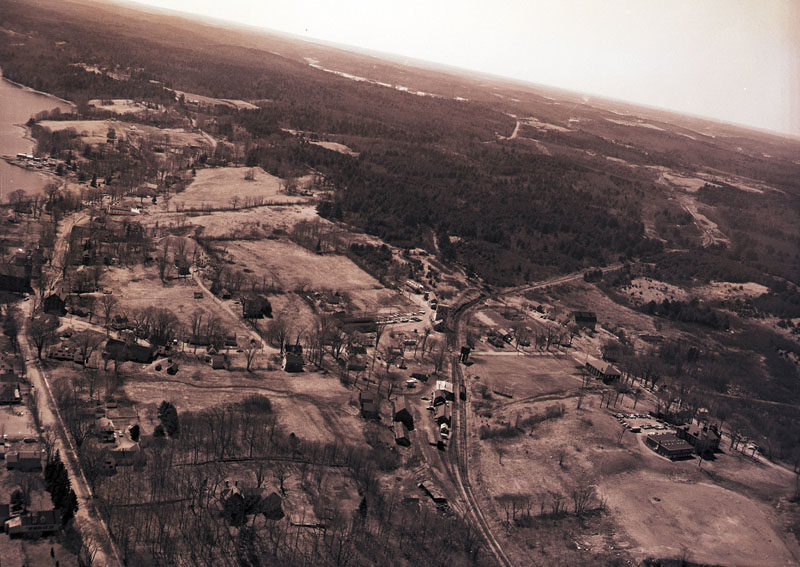
This picture shows the path of the fire in the vast unbroken space between River Road and the former Hopkins Hill Road. The uncontrolled fire raced toward Academy Hill Road, near the center of the picture, threatening the businesses and the houses there. The help provided by additional manpower proved vital, like the boys from Lincoln Academy who walked into areas where the fire trucks could not drive. (Photo courtesy Newcastle Historical Society Museum)
Last month, I wrote of the beginnings of a fire company in Newcastle and Damariscotta in 1896, and how the towns worked together to get buildings and equipment to defend the area. Today, all the local fire companies work together in mutual aid.
I came across an article showing how much these companies have been called on. This article I found does not credit the writer or paper it was in, but it has March 12, 1953 written across the top.
It may have been a dry year because on Tuesday, the fire companies were called out for a fire on Chase’s Point, Sheepscot, and on Wednesday, they were called again, to Bristol.
Then Newcastle was hit. It all started simply enough. Hot ashes spread from a trash pile on the River Road, what is now Route 1 in Newcastle, between the then Fred Sherman house and the Lincoln Terrace.
It was accepted practice to burn trash at home in the rural area. Many people had outdoor incinerators to cut down on the amount of papers, etc. that had to be taken to the dump. It was a carryover from early days when it was possible to get rid of burnable items in a wood burning stove.
As with this story, people were sometimes careless with these outside burners and ashes were not always cold when they were left unattended. So much damage was done through the years, the practice was stopped.
This time, hot ashes on a trash pile escaped. They spread over the land behind the houses along in a row. This was before the new road through Newcastle was built in 1960. The accompanying picture shows much open land, and I am sure much trash had been building up there for years.
It was actually the year the bridge that now goes across the Damariscotta River, between Newcastle and Damariscotta was dedicated. The bridge had been completed and opened to traffic in 1952 but its dedication was not held until the time of the Newcastle Bi-Centennial celebration in the summer of 1953.
When the not-dead ashes began to burn, the flames hit the dead grass and bushes behind the row of houses, the patches grew larger and with the wind, spread north to behind the Clark’s Beverages building.
Clark’s Beverages was owned and run by Chester Clark with the help of his son-in-law, Winslow Billings, and crew. Winslow and his wife, Phyllis Clark Billings, Chester Clark’s daughter, lived in the old house on Hopkins Hill. The fire spread up around the buildings.
Before the fire company arrived, individuals with brooms, brushes, pails of water and any other handy weapons slowed the fire as it almost encircled the Billings house but the crew was able to keep it away from both the house and barn and they were not harmed.
Newcastle, Damariscotta, Waldoboro, and Sheepscot fire companies responded to the call. They came in through High Street and the then Hopkins Hill Road, now called Hillcrest Road, to meet the fire head on.
Portable mill owner Howard E. Wright had moved his operation to the west side of the Hopkins Hill Road, in the area where the railroad tracks come through from South Newcastle.
Wright was born in Vermont and came to this area, settling on the Pond Road where he had a farm. He married Amy Wetherby and they had four sons. His sons worked with him at least part of the time, but by 1953 they were grown men and I do not know who was in his crew.
Howard had stacked the newly sawed lumber on the open hill to dry. The fire could not be stopped before it ravaged the newly sawn lumber pile. Later, the Wrights reported that of the 200,000 feet of lumber, almost half of it was destroyed. The loss was partially covered by insurance.
The fire headed for the village. Several houses like the Lewis and Sproul homes were in imminent danger. It was feared that nothing could stop the flames from the oil tanks of Collins and Pucky and the stores of Newcastle Grain and the Diamond Match Company.
The Lincoln Academy boys were called in to help. More manpower was needed with hand pumps to stop the blaze. It kept creeping forward. Fortunately the wind was not high and with the extra volunteer manpower help, the blaze was brought under control.
It has been common in the past, in the fall, for the fire company to burn unmowed fields or the crews along the main highway to burn adjacent fields to keep just such a fire from starting accidentally, but this was March and the fire was not expected.
Great credit was given to the Lincoln Academy boys and all others who worked valiantly to stop the blaze.



